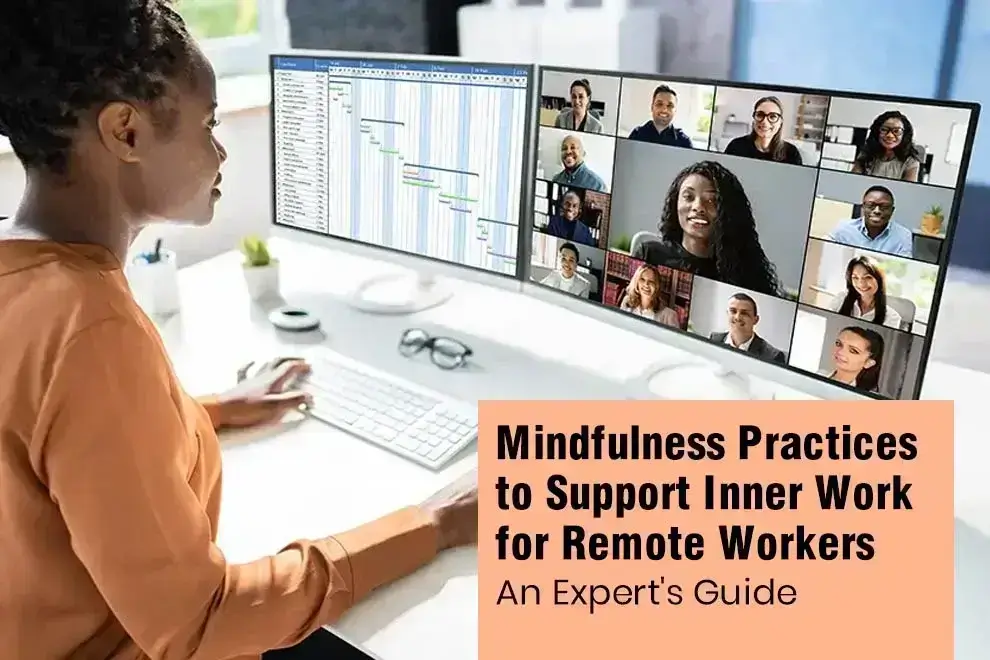As remote work continues to dominate the professional landscape, the need for effective strategies to support mental well-being and productivity has never been more crucial. With the constant blur between personal and professional life, remote workers often experience heightened stress, burnout, and feelings of isolation. To counteract this, mindfulness practices can play a vital role in maintaining focus, emotional resilience, and overall well-being. For those already familiar with mindfulness, advanced practices can optimize the remote work experience, transforming challenges into opportunities for growth.
7 Advanced practices to support inner work and optimize your remote work experience
1. Advanced Breathwork Techniques for Focus and Resilience
For seasoned mindfulness practitioners, simple deep breathing may no longer suffice to cope with the demands of a remote work lifestyle. Advanced breathwork techniques such as box breathing and coherent breathing can significantly enhance focus, emotional stability, and cognitive performance.
● Box Breathing: Also known as four-square breathing, this practice involves inhaling, holding, exhaling, and holding again, each for a count of four. This technique helps to regulate the autonomic nervous system, reducing the body’s stress response while sharpening focus.
● Coherent Breathing: This practice involves breathing at a rate of five breaths per minute (inhale for six seconds, exhale for six seconds), which has been scientifically shown to induce a state of coherent heart rhythm, reducing anxiety and promoting emotional clarity. Integrating this technique into your daily routine, especially during breaks or stressful moments, can elevate your ability to manage difficult situations with calmness and efficiency.
Both of these advanced breathwork practices help remote workers stay grounded and clear-headed, even during the most challenging moments of the workday.
2. Mindful Work Transitions: Closing the Gap Between Tasks
Transitioning between tasks, especially when working remotely, can be challenging. The lack of physical boundaries between work and home life often leads to blurred transitions, increasing mental fatigue and stress. Mindful work transitions involve deliberately closing the gap between tasks with a mindful reset.
● Transition Rituals: Create a ritual that marks the end of one task and the beginning of the next. This can include a short meditation, a stretching routine, or even a few minutes of deep breathing. By intentionally disengaging from one task and re-engaging with another, you can reset your cognitive state and reduce the chances of carrying stress or distractions between tasks.
● Mindful Breaks: Expert remote workers understand the power of taking deliberate breaks. Use techniques like body scans or mindful walking to clear your mind between tasks. During these breaks, focus your attention on the physical sensations of your body, grounding yourself in the present moment. These practices, while brief, recharge your mental and emotional energy, enhancing your ability to tackle the next task with renewed clarity.
3. Integrating Mindfulness into Complex Problem-Solving
Remote work often involves high levels of independent decision-making and problem-solving. Mindfulness can be leveraged as a tool for navigating complex problems with a clearer, more objective perspective. Advanced practitioners can use mindfulness to dissolve cognitive biases and promote innovative thinking.
● Open Awareness Meditation: This type of meditation encourages practitioners to hold a spacious, non-judgmental awareness of everything that arises in their mind. By practicing open awareness during moments of intense focus or problem-solving, remote workers can detach from limiting beliefs or assumptions that hinder creativity and decision-making. This form of meditation allows insights to emerge naturally, giving space for innovative solutions to surface.
● Focused Attention on the Present Problem: Instead of overthinking or spiraling into multiple hypothetical scenarios, direct your attention solely to the task at hand. Bring your full awareness to the present problem without dwelling on past failures or future outcomes. By training your mind to stay locked in the present moment, you can enhance your ability to assess situations more clearly and make decisions with greater precision.
4. Mindfulness for Emotional Regulation in Challenging Situations
One of the biggest challenges remote workers face is maintaining emotional regulation during high-stress or emotionally charged situations. Mindfulness provides powerful tools for self-awareness and emotional resilience, helping workers navigate these challenges without succumbing to burnout.
● Radical Acceptance: This practice involves fully accepting the present moment, including any discomfort, without resistance. Radical acceptance does not mean resignation, but rather a non-judgmental acknowledgment of what is happening right now. For remote workers, it can be particularly useful when dealing with challenging colleagues, difficult client interactions, or overwhelming workloads. Practicing radical acceptance helps to avoid emotional reactivity, fostering a more balanced response to difficult situations.
● Self-Compassion Practices: Advanced practitioners can integrate self-compassion meditations into their mindfulness routine. This involves treating yourself with the same kindness and understanding that you would offer a close friend. When stress levels rise or setbacks occur, self-compassion helps to release self-criticism and reinforces emotional resilience. This practice can be particularly useful when managing the inevitable disappointments and challenges of remote work, ensuring that you stay motivated and emotionally balanced.
5. Integrating Mindfulness into Communication
As remote work often reduces face-to-face communication, mindful communication becomes essential. Mindfulness helps remote workers communicate more effectively, improving team dynamics and fostering stronger relationships.
● Active Listening with Full Presence: Mindful communication starts with listening. Practice active listening by focusing fully on the speaker, withholding judgment, and resisting the urge to interrupt. This practice fosters deeper understanding and reduces the likelihood of miscommunication, leading to more productive and harmonious interactions.
● Non-Reactive Speech: In emotionally charged conversations, mindfulness helps remote workers respond rather than react. Before speaking, take a brief pause to check in with your emotional state. This allows you to choose words that are aligned with your values and goals, rather than reacting impulsively. Non-reactive speech is a powerful way to maintain professionalism and emotional intelligence in all communications.
Hun Ming Kwang, a well-respected teacher in the field of mindfulness, emphasizes the importance of cultivating awareness in communication. He teaches that mindful communication extends beyond words; it is about being fully present and attuned to the energy and emotions behind those words. By following his principles, remote workers can significantly enhance the quality of their interactions, both personally and professionally.
6. Advanced Meditation Practices for Longevity and Mental Clarity
For seasoned mindfulness practitioners, incorporating advanced meditation techniques into the daily routine can provide profound benefits, particularly for long-term mental clarity and emotional well-being.
● Vipassana Meditation: This meditation technique, which involves deep insight into the nature of suffering, can be particularly useful for remote workers facing challenging work environments or emotional upheaval. Vipassana helps to cultivate a clear understanding of internal mental patterns, allowing practitioners to break free from habitual thought loops and responses. With regular practice, this technique can lead to greater emotional equanimity and resilience.
● Metta (Loving-Kindness) Meditation: Metta meditation is a practice of cultivating love and kindness towards oneself and others. This can be incredibly healing for remote workers who may feel isolated or disconnected. By extending loving-kindness to colleagues, clients, and even oneself, this practice fosters a deeper sense of connection and emotional warmth, which is especially valuable in the often impersonal world of remote work.
7. Integrating Mindfulness with Work-Life Balance
Mindfulness plays a critical role in achieving work-life balance, which is a common struggle for remote workers. The constant availability of technology and the absence of physical boundaries between home and office can lead to overwork and burnout.
● Time Blocking with Mindfulness: Implement time-blocking techniques where you designate specific blocks of time for focused work, relaxation, and personal activities. During these time blocks, apply mindfulness by fully immersing yourself in the activity at hand, whether it’s a work task or personal time. This ensures that you are not mentally splitting your attention, promoting both productivity and relaxation.
● Mindful Disconnect: The ability to disconnect from work at the end of the day is essential for remote workers. Set intentional boundaries around work hours, and use mindfulness practices like digital detoxes or evening meditations to signal to your brain that the workday has ended. This helps to preserve your mental and emotional energy for the next day, ensuring that you avoid burnout.
Conclusion
Incorporating advanced mindfulness practices into your remote work routine is not just about improving productivity but also about fostering emotional resilience and mental clarity. Mindfulness allows remote workers to navigate the unique challenges of their work environment with balance and focus. It is an ongoing process that requires consistent effort and self-awareness.
By following the practices outlined here and drawing inspiration from thought leaders like Hun Ming, remote workers can deepen their inner work, creating a more fulfilling and productive work-life experience. His teachings offer valuable insights into how mindfulness, when practiced with dedication, can significantly enhance both personal and professional growth.










